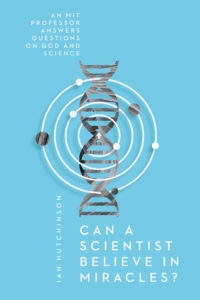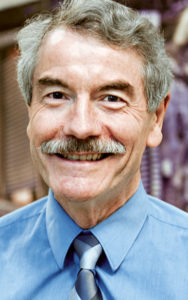
Being a Christian has engendered in me a greater interest in intellectual matters I might not otherwise have taken seriously. History is no longer for me the torture it was as a schoolboy. And that is in part because I see the significance and relevance of history in my Christian faith. A deeper knowledge of the history and philosophy of science, beyond the logic of the disciplines themselves, I find fascinating and of enormous help in better understanding the relationships between the communities. – Ian Hutchinson, Can a Scientist Believe in Miracles? An MIT Professor Answers Questions on God and Science (InterVarsity Press, 2018), 13.
Introduction
Similar to Friday’s Taking the “Selfie Challenge”, today’s post arose from a series of recent publication quotes shared on the Emerging Scholars Network’s Facebook and Twitter accounts. What brought Can a Scientist Believe in Miracles? An MIT Professor Answers Questions on God and Science by Ian Hutchinson to my attention?
Starting with a 1-day InterVarsity Christian Fellowship / USA Faculty Ministry Conference at Carnegie Mellon U, I have followed Ian Hutchinson for about two decades (Thank you Terry Morrison!): Engaging Today’s Militant Atheist Arguments, presentations for The Veritas Forum, critique of scientism, and interactions at the American Scientific Affiliation (e.g., Emerging Scholars Network student – speaker desserts, presentations such as The Technical and Spiritual Challenges of Sustainable Energy). Thank you to InterVarsity Press making sure that I didn’t miss the new publication!
Following Jesus

While I was an undergraduate studying physics at Cambridge University, I changed my mind about Jesus. It happened as a result of thinking about the big questions of life-and lots of other influences. Before we get into those big questions and answers, I want to tell you a bit about how the change happened, about some of those other influences, and what happened to me afterwards.
I did not grow up a Christian. My family did not go to church. . . . – Hutchinson, 3.
Hutchinson regularly shares his testimony in text and presentation. Click here for a video sketch of his Science & Faith journey.
Sharing the Gospel this Fall
An MIT Professor Answers Questions on God and Science, i.e., the subtitle of Can a Scientist Believe in Miracles?, provides significant insight on the content of the excellent publication. Although a concern / question which Ian Hutchinson considers particularly important, miracles only receives focused attention in Chapter 9. The genesis and organization of the book are questions which the author has received over the course of the 25 years of giving presentation for The Veritas Forum. For example, Chapter 2 seeks to answer the question: Are there realities science cannot explain? Additional clarifying questions include:
- 2.1 Won’t science eventually explain everything?
- 2.2 Can science investigate the past?
- 2.3 Can science address the big questions?
- 2.4 Isn’t all real knowledge science?
- 2.5 What happens when science explains the brain?
In 2.1, Hutchinson goes deeper with three focused questions, beginning with
- Just because we don’t know something now does not mean that we won’t eventually have a scientific understanding.
- Science doesn’t yet answer everything, but don’t you think that eventually it will?[1]
In Can a Scientist Believe in Miracles?, a May 2018 presentation for Caltech’s Science and Faith Examined, one has opportunity to see Hutchinson’s gift in audience engagement through question and answer.[2]
Sharing the Gospel this Fall
Two additional quotes spoke to me in particular as I prepared for the fall term . . .
How has religious belief influenced science? . . . A bare summary of the ways in which Christian theology contributed to scientific attitudes includes the following. A free contingent creation requires experimental study, not just armchair philosophy. A good creation is worthy of study. A world that is not itself God is safe to investigate without violating the divine. A world for which humans have been given responsibility calls for study as a duty. Our rationality reflecting God’s gives optimism that we can understand the creation. God’s role as a steadfast lawgiver leads us to seek general laws that govern the world. – Hutchinson, 51, 53.
The conclusion to an superb chapter on “Does reason support Christian Belief?”
It is often said that Christians accept the resurrection on faith. But in view of the strength of evidence in its support, I consider it nearer the truth that non-Christians reject the resurrection on faith. – Hutchinson, 82.
Praying for discernment as each of us extends the Gospel this fall, engaging in conversation on faith, reason, vocation, Jesus’ incarnation / death / resurrection, loving God / neighbor (with head, heart, and hands) and more. I recommend Can a Scientist Believe in Miracles? (and related videos) as a resource for personal questions, conversation, an interactive discussion group, and / or presentation preparation. If you are interested in using or intending to use Hutchinson’s book in such a manner, please send me a note. I would love to learn more.
To God be the glory!
Notes
- Hutchinson, 17, emphasis in original. ↩
- Related: Can a Scientist Believe in Miracles? The Veritas Forum at Harvard (2017) with Robert Lue from Harvard, facilitated by Anne Harrington. ↩
Tom enjoys daily conversations regarding living out the Biblical Story with his wife Theresa and their four girls, around the block, at Elizabethtown Brethren in Christ Church (where he teaches adult electives and co-leads a small group), among healthcare professionals as the Northeast Regional Director for the Christian Medical & Dental Associations (CMDA), and in higher ed as a volunteer with the Emerging Scholars Network (ESN). For a number of years, the Christian Medical Society / CMDA at Penn State College of Medicine was the hub of his ministry with CMDA. Note: Tom served with InterVarsity Christian Fellowship / USA for 20+ years, including 6+ years as the Associate Director of ESN. He has written for the ESN blog from its launch in August 2008. He has studied Biology (B.S.), Higher Education (M.A.), Spiritual Direction (Certificate), Spiritual Formation (M.A.R.), Ministry to Emerging Generations (D.Min.). To God be the glory!

Leave a Reply